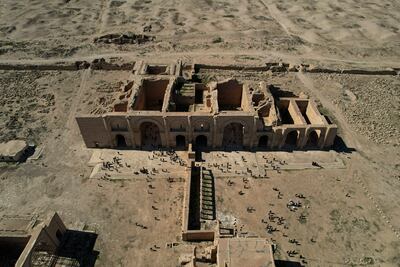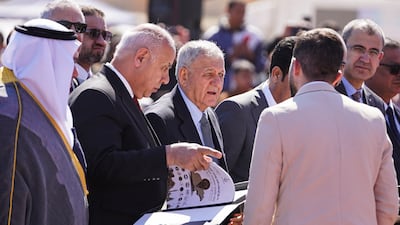For the first time in two decades, the festival spirit returned to Hatra as the 2,000-year-old city welcomed back its showcase cultural event.
Iraq's President Abdul Latif Rashid opened the Hatra International Festival on Thursday. It hasn't run since the 2003 US invasion.
Rashid emphasised the event's role as a testament to the country's rich heritage that is thriving once more.
Multiple artistic, cultural and theatrical activities were held at the Unesco-listed site, with Rashid joined by dignitaries including Ahmed Fakak Al-Badrani, the Minister of Culture, Tourism and Antiquities, and Abdulqadir Al-Dakhil, governor of Nineveh.
Folk dances, traditional fashion shows and historical costumes highlighting the area's roots were also on display at the festival, which was held three times before it was halted.

“We hope that after this, media direction and highlights of the monuments of Hatra, the archaeological area will be revived again and annual initiatives will be undertaken to revive the heritage,” visitor Abdul Karim Al-Shammari, 45, said at the event.
The festival was first held in 1994 and Al-Shammari said he still remembers being there.
“I came from south of Mosul especially to visit the festival in order to recall my old memories,” he said.
“The duration of the celebration was three days, and there were participants from all countries of the world. I remember Turkish, Gulf and Chinese folkloric groups came.”
During the event, one of the highlights was a document signed by Rashid and Al-Badrani aimed at restoring Hatra and removing it from Unesco’s List of World Heritage in Danger. It was added in 2015 in the wake of the ISIS occupation, with many of its artefacts destroyed by the group.
"The Hatra site is the first Iraqi site to be placed on the Unesco World Heritage List and was neglected for a long period," said Mohammed Al-Zakaria, director of media for the Ministry of Culture, Tourism and Antiquities.
“But today there are many projects to revive it, whether it is reviving the archaeological city or investment tourism projects located around the region in order for the city to return as a whole and attract tourists, interested parties, pioneers and archaeologists.”

Despite its recent struggles, the site welcomed a strong turnout for the event. It is located about 110km south-west of Mosul and 290km north-west of Baghdad.
“There were many people visiting Hatra for the first time and getting to know it especially from the new generation, many of whom were previously afraid," said Yaser Al-Goyani, who helped organise the event. "But now this area has been revitalised and the safety rate in it is high."
Mohammed Abu Ahmed, 55, an event volunteer, also spoke of his joy, adding: “I was wearing Arab dress, and this is the first time I have come to this area.
“It is a wonderful and safe area with beautiful monuments. What distinguishes the festival is the presence of all religions and sects. I hope to visit from time to time because of its archaeological value.”
Meanwhile, civil activist Bander Alokidy hopes its return and the newly signed agreement will help reinvigorate the area.
“The region needs great support and attention, perhaps paving roads and projects to revitalise this region located in the middle of the desert," he said. "The festival was held at a very important time, and the thing that made us happy is that it will be repeated annually."

Hatra is celebrated for its archaeological sites, which include the Temple of Maran, the Great Iwans Complex and the Temple of Allat.
Unesco describes it as “a large fortified city under the influence of the Parthian Empire and capital of the first Arab Kingdom” saying it withstood invasions by the Romans thanks to its high, thick walls that reinforced its towers.
The organisation also praised the city's temples, which it says blend Roman architecture with eastern decorative features, attesting to “the greatest of its civilisation".

